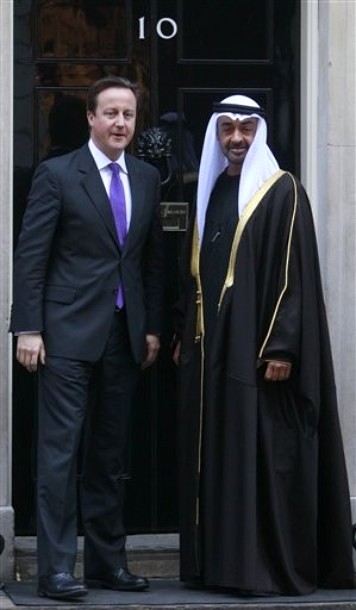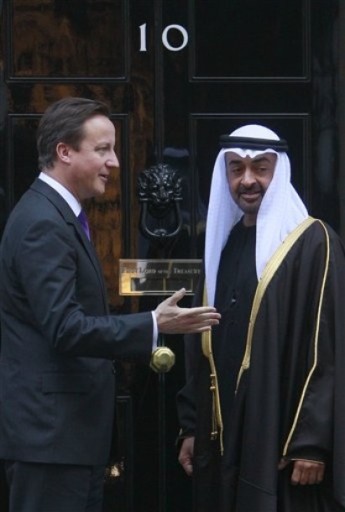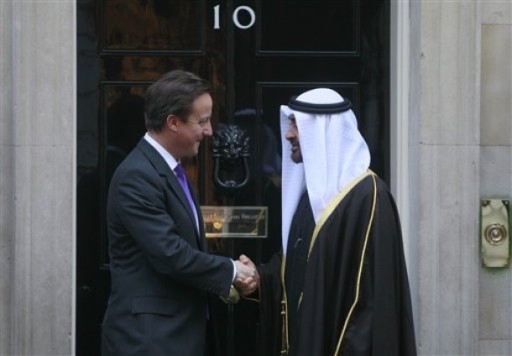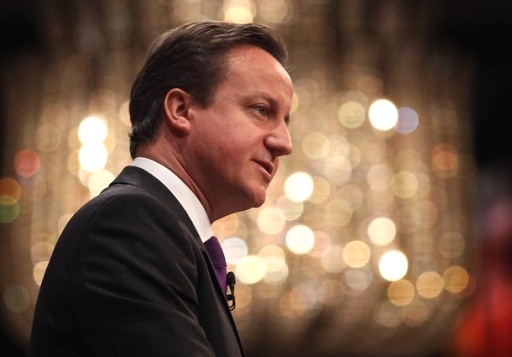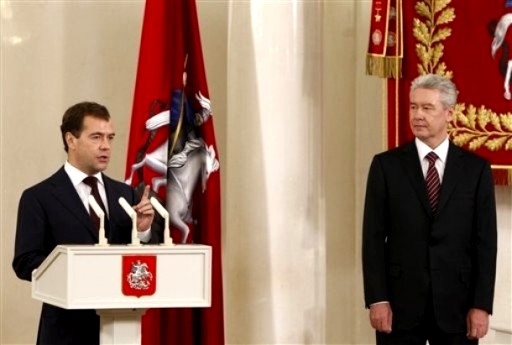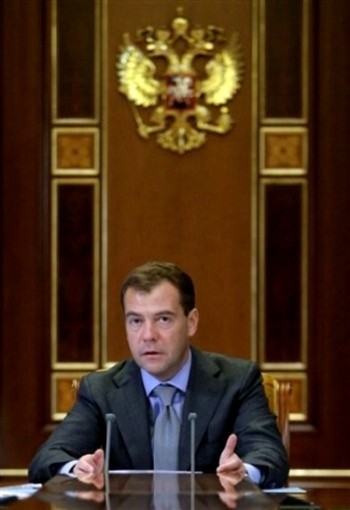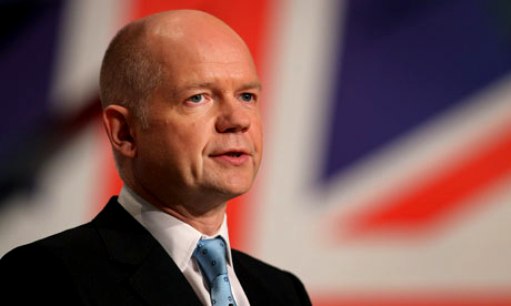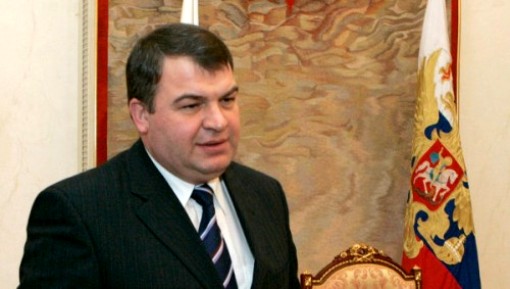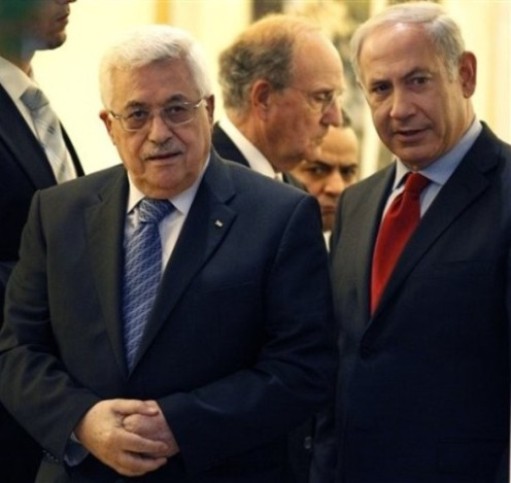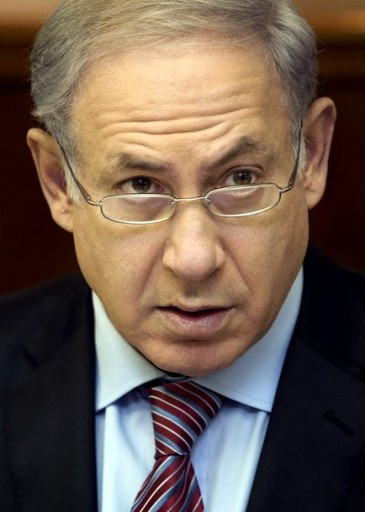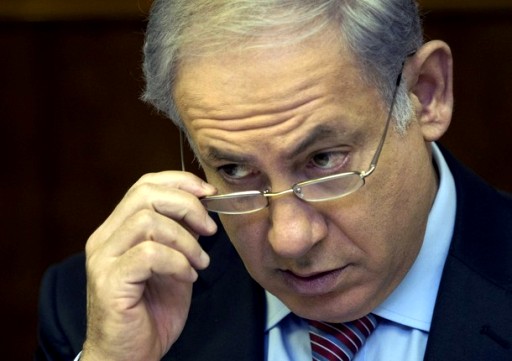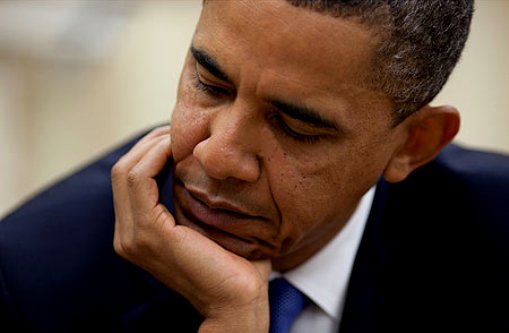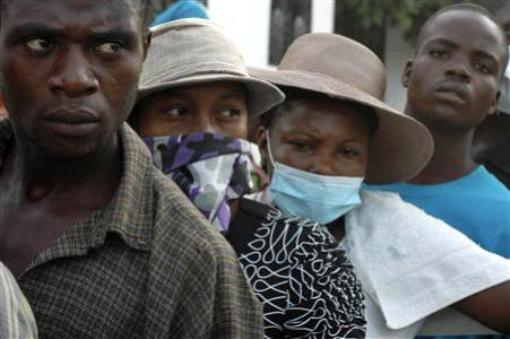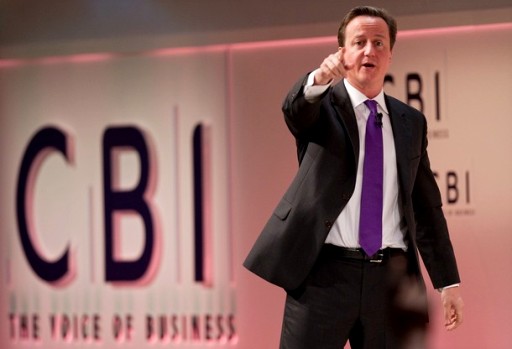
British Prime Minister David Cameron addresses delegates at the annual Confederation of British Industry (CBI) conference in central London, on October 25, 2010. Cameron vowed to help businesses create jobs and spur economic growth, less than a week after his coalition government unleashes the biggest public spending cuts in decades. (LEON NEAL/AFP/Getty Images)
(KATAKAMI /
NUMBER 10.UK) — Transcript of speech given by the Prime Minister, Mr David Cameron at CBI on Monday 25 October 2010 :
There is one question I want to answer today. Where is the growth going to come from – where are the jobs going to come from?
Over the course of this Parliament – and the next – I believe we can transform our fortunes.
We’re in a world of unprecedented economic change, with millions of new consumers and countless innovations where companies are starting with less investment than ever before, yet still becoming global giants within a matter of years.
This is an incredible opportunity for Britain, for new start-ups to flourish, for innovations to drive growth and create jobs.
Today, I want to set out what our strategy for growth will mean for Britain.
I want to tell you how we can create a new economic dynamism in our country – so we can build real confidence in our future.
First let me tell you what I won’t do.
I won’t engage in some sterile debate between laissez faire and hands-on government.
The question isn’t ‘should government be involved?’ because it is involved.
It taxes. It regulates. It invests.
The real question is what is the right kind of involvement?
I believe one of the most important things government can do is drive trade.
Last year the share of UK exports to China and India was just 3.2 per cent.
Indeed, the UK exports more to Ireland than to Brazil, Russia, India and China – combined.
These are shocking figures.
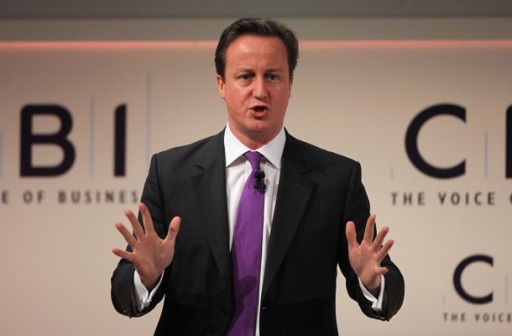
British Prime Minister David Cameron addresses Confederation of British Industry, (CBI), members at the annual CBI conference at the Grosvenor Hotel on October 25, 2010 in London, England. The CBI conference brings together leading politicians and business experts to discuss ways of delivering economic growth. (Photo by Dan Kitwood/Getty Images)
My approach is clear, British business should have no more vocal champion than the British government and that’s why I have put the promotion of British commerce and international trade at the heart of our foreign and economic policy.
So when I went to India this summer, I took the biggest visiting delegation of business leaders and entrepreneurs of any Prime Minister in recent memory.
At the European Council this week, I’ll be calling for structural reforms of the single market so Europe makes a stronger contribution to world growth
And when I go to the G20 summit in two weeks, I’ll be pushing for the completion of Doha, which could add $170 billion to the global economy each year.
But the right kind of government involvement stretches beyond banging the drum for trade.
In the weeks ahead, we will be setting out how we will bring a new emphasis on well-being in our national life, and how we will work with business to spread social and environmental responsibility across our society.
But today, I want to set out what this government will do at home to help drive growth.
There are three parts to our strategy.
First, using all available policy levers to create the right framework for enterprise and business investment.
Second, using our resources to get behind those industries where Britain enjoys competitive advantages.
Third, using our power and muscle to make it easier for new companies and innovations to flourish and create a new economic dynamism.
Let me take each in turn.
First, providing a competitive environment for private sector growth.
Successful, high-growth economies are like ecosystems –they are organic, evolve through trial and error and depend on millions, billions, of individual preferences, choices and relationships.
Governments can expect to intelligently design all this as much they can expect to intelligently design the Great Barrier Reef.
But what they can do is create an environment in which businesses are confident enough to invest.
Today, British businesses are rebuilding their balance sheets because they have relatively strong profit and loss accounts.
In the first six months of this year, they ran a financial surplus worth almost five percent of GDP.
If we are to get back to strong growth, these profits need to turn into productive investment – and my message to you today is that we are providing the stability for that investment.
In five years’ time, we will have balanced the books.
The sharp tax rises and huge interest rates you feared, the uncertainty you felt – these are things you no longer need to worry about.
With our Budget in June and the Comprehensive Spending Review last week, we took Britain out of the danger zone.
The world’s responded.
Britain’s borrowing costs have dropped to the lowest for a generation.
And the IMF and OECD, you, the CBI, and the thirty-five business leaders who wrote to the Daily Telegraph last week have backed the approach we have taken in tackling the deficit.
What’s more within five years, we will have cut corporation tax from twenty-eight percent to twenty-four percent our education reforms and new apprenticeships will have started to expand our skills base and our new one-in, one-out rule for regulation will have stopped the rise of domestic red tape.
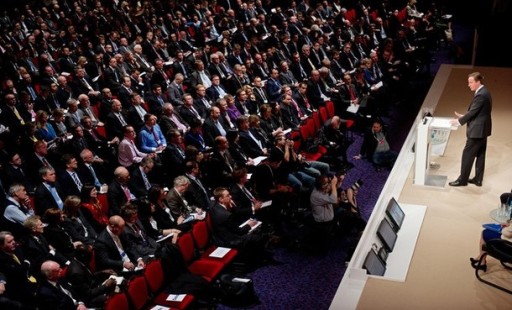
British Prime Minister David Cameron (R) addresses delegates at the annual Confederation of British Industry (CBI) conference in central London, on October 25, 2010. Cameron vowed to help businesses create jobs and spur economic growth, less than a week after his coalition government unleashes the biggest public spending cuts in decades. (LEON NEAL/AFP/Getty Images)
Add to these our cut in the small business profits rate and the fact we have waived national insurance contributions for new businesses in most areas of the country and you have the conditions to breed confidence and investment and boost productivity for the long-term.
And let me give you this assurance, as we control our borders and bring immigration to a manageable level, we will not impede you from attracting the best talent from around the world.
But business confidence doesn’t just come from financial and human assets.
It comes from physical assets too – from our infrastructure.
For too long, we have postponed difficult decisions on this – and it shows.
Congestion on our roads cost our economy £20 billion a year.
In one year alone, there were fourteen million minutes of delay to rail journeys in our country, costing £1 billion in terms of time lost to passengers.
Other countries understand the importance of modern infrastructure to economic growth.
China is building tens of thousands of miles of roads, a new network of intercity railway lines and a dozen or so nuclear power plants.
While they’ve been moving forwards, we’ve been standing still.
Not any more.
I can announce today the UK’s first ever national infrastructure plan.
It’s a plan to completely update and modernise our infrastructure, so British business is free to compete with the rest of the world.
In the Budget, you saw the first parts of this plan, as we did not reduce capital spending compared to the last government’s figures.
Last week, in the Spending Review, we went further, and announced an additional £8.6 billion over the next four years for capital spending.
Indeed, even in these constrained times, we will invest over £30 billion in transport projects over the next four years – which is more than was invested during the past four years.
High-speed speed rail to Birmingham.
Crossrail, the Thames Gateway and the underground in London.
The Mersey Gateway.
Major improvements to the East and West Coast mainlines.
All have been given the green light.
And today, we are publishing a detailed plan setting out the infrastructure Britain needs and how we will unlock £200 billion worth of public and private sector investment to deliver it.
So we’ll work with utility companies to get more investment in our energy, with construction companies on our roads, with the telecommunications industry on broadband.
This collaboration is already working.
Virgin Media is rolling out a new superfast broadband service this week.
Combine that with the support we are giving in rural areas and BT’s planned investment and it will mean that within two years, over thirteen million homes and businesses in the UK – including some in our rural areas – will be hooked up to some of the fastest broadband speeds in the world.
This is incredibly exciting – and a clear demonstration of how determined we are to work with you to build the right framework for growth in Britain.
Right now, every part of government is thinking about what it can do to support growth from to environmental regulation to local government through better incentives for development so let us know what you think, give us your ideas.
Together, we can create the conditions in which business can thrive.
The second part of our strategy is getting behind those industries where Britain already enjoys competitive advantages.
All over the world, governments are identifying dynamic sectors in their economy and working strategically to strengthen them.
In America, President Obama is ramming home the advantage they already enjoy in clean technology with $38 billion of investment.
And Germany is building on the success of their car industry by investing €500 million in electric car technology.
What they understand is that when you’re looking for growth opportunities you don’t stick a pin in a map and drop down a research centre here or arbitrarily back an industry there – you go with the grain of what is already working.
We understand that too.
We have great industrial strengths across our country, underpinned by world-beating companies.
Green technologies in the North East.
Creative industries in London, Manchester and Glasgow.
Financial services in Edinburgh.
In retail, pharmaceuticals and advanced engineering.
We have made the strategic decision to get behind these strengths.
You saw the evidence of that in our Spending Review.
Yes, money is incredibly tight.
But we protected the science budget in cash terms.
And we are also investing £220 million in a new world-class Centre for Medical Research and Innovation £1 billion to create one of the world’s first Carbon Capture and Storage demonstration plants, with three more projects to follow and £200 million in low carbon technology, including offshore wind.
The potential for Britain to lead in this industry is immense.
We don’t just have the wind, we have the first-class research capability and a wealth of experience across the aerospace, engineering and energy sectors.
But here’s the problem.
We need thousands of offshore turbines in the next decade and beyond – each one as tall as the Gherkin.
And manufacturing these needs large factories which have to be on the coast.
Yet neither the factories nor these large port sites currently exist.
And that, understandably, is putting off private investors.
So we’re stepping in.
To help secure private sector investment in this technology, we’re providing up to £60 million to meet the needs of offshore wind infrastructure at our ports.
And to help move things forward, the Crown Estate will also work with interested ports and manufacturers to realise the potential of their sites.
It’s a triple win.
It will help secure our energy supplies, protect our planet and the Carbon Trust says it could create 70,000 jobs.
And it’s a clear demonstration of the coalition’s approach – alert to those sectors that are strong but could be stronger, alive to the possibilities they promise and active about exploiting them.
But the third – and potentially the most exciting – part of our strategy for growth is to make it easier for new companies and innovations to flourish.
For well over a century, the shape of successful business remained largely the same.
Heavy investment in capital and raw materials. Goods developed, mass-produced and then shipped around the world. Organisations growing slowly and coming to dominate markets for years to come.
But in recent decades, that pattern has been blown apart.
There has been a surge in new, young, high-growth, highly innovative firms.
It wasn’t long ago that Apple, Cisco and Google didn’t even exist – now each one has a market value of over $100 billion.
Skype, Facebook and Twitter have generated billions of dollars and reached a global scale more quickly and with less capital than any companies before.
And the most innovative firms are growing twice as fast, both in terms of employment and sales, than those that fail to innovate.
The impact this change is having on our economic landscape is unprecedented.
In 1950, the average life of a company in the S&P index was forty-seven years.
By 2020, it will fall to just ten years.
And today, many more of our jobs are dependent on new, young and dynamic businesses.
It’s astonishing to think that between 1980-2005, nearly all net job creation in the United States occurred in firms less than five years old.
And here in Britain, just six per cent of UK businesses are high-growth but they generated over half of the net employment growth between 2005 and 2008.
All this has massive policy implications for government.
To build that new dynamism in our economy, to create the growth, jobs and opportunities Britain needs we’ve got to back the big businesses of tomorrow, not just the big businesses of today.
That means opening up access to finance, creating an attractive environment for venture capital funding, getting banks lending to small businesses again and insisting that a far greater proportion of government procurement budgets are spent with small and medium-sized firms.
And in the days and months ahead we will be setting out our plans in all these areas.
But today I want to focus on two elements of our approach in particular.
One is helping to bridge the gap between innovation and commercial success.
The fact is that we are not as good as some of our competitors in turning great ideas on the drawing board into prototypes in a laboratory and actual goods and services people can buy.
That’s why I can announce today that we will invest over £200 million in Technology and Innovation Centres over the next four years.
These centres will sit between universities and businesses, bringing the two together.
They won’t just carry out their own in-house research, they will spread knowledge too connecting businesses – large and small, new and old – to potential new technologies, making them aware of funding streams and providing access to skills and equipment.
It’s the sort of thing you see in Orgreave, where the University of Sheffield, Rolls Royce and Boeing are all working together or in Germany, where their Fraunhofer Institutes have been crucial in developing the MP3 licence.
These centres will be great for research, great for business – and they’re going to put Britain back at the top table for innovation.
Another area where I am determined we help is through spreading competition.
I believe in competition.
I believe when new entrants challenge big business, everyone wins.
This hasn’t always been the view of the government.
In the 1980s, initially the government attempted to build British Telecom and Cable and Wireless into ‘national champions’ by sheltering them from competition.
This approach failed – and today there are more than 5500 telecommunications companies in Britain, generating a turnover of £60 billion and employing over 200,000 people.
But today, some industries are too uncompetitive, with significant barriers to entry and obstacles to growth.
We’re going to challenge the status quo.
As Vince Cable will tell you later today, we will merge the competition functions of the Office of Fair Trading and Competition Commission and introduce a range of other changes, to create a much tougher and more streamlined competition regime.
We want to reduce the uncertainty and the length of time it takes to make a decision in the current system.
Above all, we want to help new companies break into existing markets.
When we say we’re going to build a new economic dynamism – we mean it.
Today I have set out this government’s strategy for growth.
In some ways it’s wrong to call it a strategy – it’s more a wholesale change in attitude.
Where there was neglect about maintaining a basic framework for business, we are bringing a pro-enterprise attitude – dealing with the deficit, cutting business taxes, investing in infrastructure.
Where there was complacency about our competitive advantages, we are bringing an hands-on attitude – consolidating those strengths, getting behind key industries in every region of our country.
And where there was a backward-looking, unhelpful approach to innovation and start-ups we are bringing an optimistic attitude – backing the young insurgent companies, pulling down the barriers that are holding them back.
This is, of course, just the beginning.
In the weeks and months ahead, Ministers will be developing detailed plans to turn this strategy into action.
Everything – from bank lending to skills, green tech to high tech, competition to innovation, international trade to local growth – will be put under the microscope.
That forensic, relentless focus on growth is what you will get from this government.
What I need in return from you is a commitment to create and innovate; to invest and grow; to develop and break boundaries.
The new jobs, the new products, the new ideas that will lift us up will be born in the factories and offices you own – not in the corridors of Whitehall.
So take advantage of the changes we are making, and work with me in returning this country to prosperity.
I know this can happen.
I passionately believe our best years are ahead of us.
Together we can make the years ahead the most entrepreneurial and dynamic in our country’s history.

